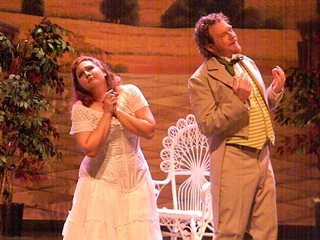|
Back
For Love or Money? Miami
Colony Theatre
06/28/2014 - & June 29*, 2014
Gaetano Donizetti: Don Pasquale
Stefano de Peppo (Don Pasquale), Daniel Snodgrass (Dottore Malatesta), David Pereira (Ernesto), Gina Galati (Norina), Eric Dobkin (Notario)
Miami Lyric Opera Orchestra and Chorus, Pablo Hernandez (chorus master), Leo Walz (conductor)
Raffaele Cardone (director), Carlos Arditti (scenery), Deborah Dier-Weisman (costumes)

G. Galati & D. Snodgrass (Courtesy of MLO)
Don Pasquale has its devotees who will swear it is Donizetti’s best, at least his best comedy. We all have our favorites and this opera has some stunning music. The story is funny and at times even clever but there it also has something uncomfortable. Its female lead, Norina, comes across as a narcissistic sociopath; and by continuing to pursue her with such rigor once he sees her true colors, her lover, Ernesto, shows he is masochistic; the fact that she is a young widow might raise some questions about Norina’s husband’s demise. Dr. Malatesta is a friend who ranks just above Iago on the immorality scale. Don Pasquale intends to financially cut off his nephew for not marrying a chosen rich woman. There are no loveable characters, and no one shows much remorse. This might explain why this comedy, with possibly superior music, has never attained the popularity of Il barbiere or L’elisir.
Okay, okay, it’s a featherweight farce, why take it so seriously? And with music like this, flaws in the libretto are superfluous. And no matter how well you know, or many times you’ve seen Don Pasquale, once that frothy overture starts, it is hard not to have a huge smile as you look forward to the fun (if excessive hamming doesn’t get in the way). It is thrilling to listen as Donizetti spawns endless melodic moods from such familiar comic material.
So, this time it is about the music. The quartet provides every possible duet combination (except tenor-baritone) and a few knockout ensembles. The audience will survive with one weak link but probably attention will wane if there are two. If there are more, it is best to leave at the end of the first act. Without first-rate performers, it can be hard to understand people getting excited over this work.
Though there were naturally some modest moments, this cast delivered the goods quite assuredly. David Pereira is a tenor of the old school where there is no intention to overpower us with anything but several of the repertoires most beautiful moments, and his immaculate instrument couldn’t be suited to a better role. He sometimes gets covered by the orchestra which undoubtedly results from its awkward placement in this theatre. Gina Galati, Pereira’s lover Norina, makes up in power and flexibility what she lacks in vocal color. Her appearing somewhat older than Ernesto adds a credible dimension to a story in which her character shows profoundly greater emotional maturity. The even toned Malatesta of Daniel Snodgrass joyfully humiliates both uncle and nephew, yet his charm just as easily recaptures their devotion to him. As is usually the case Malatesta’s third act duet with Pasquale stops the show. It is refreshing to see a performance in which the title character really dominates the action. Stefano de Peppo is the true definition of a basso buffo. The voice has tremendous strength; even the fastest patter sounds especially precise to the ears of a non-Italian speaker. Unfortunately, neither his costume nor his Albert Einstein hair suggests the fat hapless wannabe lover mentioned in the text. As an actor, he physically suggests a man much younger than his character. Many of us are tired of performers “acting old,” so a spritely Pasquale is refreshing.
The orchestra under the direction of Leo Walz had some missteps in the first act but recovered quickly to offer a performance that was never sluggish and was as playful as the stage performers. Miami Lyric Opera’s chorus has never sounded as firm and confident.
As usual, the music at Miami Lyric Opera trumps the production values; isn’t that reason enough to celebrate in this era where more is so often considered more? Let’s once again praise Miami Lyric Opera for having its priorities in order resulting in a most memorable performance of a work too often neglected.
Jeff Haller
|